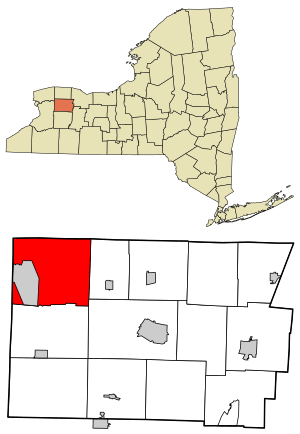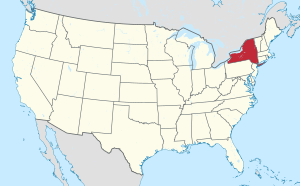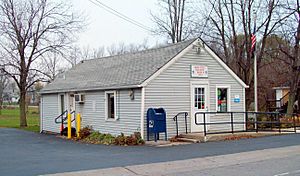Alabama, New York facts for kids
Quick facts for kids
Alabama, New York
|
|
|---|---|

Location of Alabama in Genesee County and New York
|
|

Location of New York in the United States
|
|
| Country | United States |
| State | New York |
| County | Genesee County |
| Incorporated | 1826 |
| Named for | Alabama |
| Area | |
| • Total | 42.78 sq mi (110.79 km2) |
| • Land | 42.37 sq mi (109.74 km2) |
| • Water | 0.41 sq mi (1.05 km2) |
| Elevation | 663 ft (202 m) |
| Population
(2020)
|
|
| • Total | 1,602 |
| • Density | 37.81/sq mi (14.60/km2) |
| Time zone | UTC-5 (EST) |
| • Summer (DST) | UTC-4 (EDT) |
| ZIP code |
14013
|
| Area code(s) | 585 |
| FIPS code | 36-037-00474 |
Alabama is a small town located in Genesee County, New York, in the United States. It's in the northwestern part of the county. Important roads like New York State Routes 63 and 77 cross paths here. In 2010, about 1,869 people lived in Alabama. The town was named after the state of Alabama.
Contents
History of Alabama, New York
Early Settlements and Naming
The area that is now the Tonawanda Indian Reservation once had a trading post. A French fur trader named William Poudrit set it up. His name, "Poodry," is still used by some Native Americans today.
The first settlers arrived around 1806 in what is now West Alabama. The Town of Alabama was officially created in 1826. It was formed from parts of the Town of Pembroke and the Town of Shelby.
The town was first called "Town of Gerrysville." This name honored Vice-president Elbridge Gerry. But in 1828, the town changed its name to Alabama, which it still uses today.
The Famous Spring House Hotel
Long ago, there were eight "sour springs" in the area. People believed the water from these springs had special healing powers. So, they bottled the water to sell as medicine.
Because of these springs, a large hotel was built nearby. It had thirty-seven rooms and was called "Spring House." Sadly, the building burned down in 1914. Today, the land where the hotel once stood is part of the Iroquois National Wildlife Refuge.
Geography of Alabama, New York
Location and Size
The town of Alabama covers about 42.8 square miles (110.79 square kilometers). Most of this area is land, about 42.5 square miles (109.74 square kilometers). A small part, about 0.2 square miles (0.49%), is water.
Rivers and Borders
Two main creeks flow through the town. The Tonawanda Creek runs through the southern part. The Oak Orchard Creek flows through the northern part.
The northern edge of the town is the border with Orleans County. The western edge of the town borders Erie and Niagara counties.
Population of Alabama, New York
| Historical population | |||
|---|---|---|---|
| Census | Pop. | %± | |
| 1830 | 783 | — | |
| 1840 | 1,798 | 129.6% | |
| 1850 | 2,054 | 14.2% | |
| 1860 | 2,061 | 0.3% | |
| 1870 | 1,805 | −12.4% | |
| 1880 | 1,975 | 9.4% | |
| 1890 | 1,654 | −16.3% | |
| 1900 | 1,611 | −2.6% | |
| 1910 | 1,797 | 11.5% | |
| 1920 | 1,530 | −14.9% | |
| 1930 | 1,734 | 13.3% | |
| 1940 | 1,763 | 1.7% | |
| 1950 | 1,766 | 0.2% | |
| 1960 | 1,931 | 9.3% | |
| 1970 | 1,872 | −3.1% | |
| 1980 | 1,926 | 2.9% | |
| 1990 | 1,998 | 3.7% | |
| 2000 | 1,881 | −5.9% | |
| 2010 | 1,869 | −0.6% | |
| 2020 | 1,602 | −14.3% | |
| U.S. Decennial Census | |||
In 2000, there were 1,881 people living in Alabama. These people lived in 663 households, and 483 of those were families. The population density was about 44 people per square mile.
About 37.4% of households had children under 18. Most households (63.7%) were married couples living together. About 22% of all households were individuals living alone.
The population was quite diverse in age. About 30% of the people were under 18 years old. The average age in the town was 35 years.
Notable People from Alabama
- Charles Dinsmoor – An inventor who was born in Alabama Center.
- John Rankin Gamble – A former US Congressman from Dakota Territory.
Communities and Locations in Alabama
- Alabama (or Alabama Center) – This is the main village, located where Routes 63 and 77 meet. You can find a restaurant and a small market here.
- Basom – This village is on NY-77. It once had a train station and was named after a town supervisor from Alabama.
- Indian Falls (formerly "Tonawanda Falls") – A village at the southern edge of the town on NY-77. The Tonawanda Creek flows through here and has a beautiful waterfall. The rapids above the falls were used for water power long ago.
- Iroquois National Wildlife Refuge – A large federal wildlife area that is partly located in the northern part of the town. It's a protected home for many animals.
- Meadeville – A small village inside the Tonawanda Wildlife Management Area.
- Oak Orchard Wildlife Management Area – Another conservation area, partly in the northern part of the town, protecting wildlife.
- South Alabama – A village on NY-63, close to the Oakfield border. It used to be called "Smithville."
- Tonawanda Reservation of the Seneca tribe – A part of this Native American reservation is along the western border of the town. Bloomingdale Road goes through the reservation.
- Tonawanda Wildlife Management Area – A state conservation area in New York, also partly in the northern part of the town.
- The Alabama Hotel – Located at the intersection of Routes 63 and 77. It's famous for a quote from Spiro Agnew in 1968 about its "really fine wings."
- West Alabama – This used to be a village and is now a location in the northwest corner of the town on NY-77.
- Wheatville – A village east of Alabama village, near the crossroads of Knowlesville and Lockport Roads.
- Wheatville Station – A location south of South Alabama.
- White Memorial Game Farm – This used to be a farm mainly for raising pheasants. It's now used for other outdoor activities.
See also
 In Spanish: Alabama (Nueva York) para niños
In Spanish: Alabama (Nueva York) para niños
 | Tommie Smith |
 | Simone Manuel |
 | Shani Davis |
 | Simone Biles |
 | Alice Coachman |


